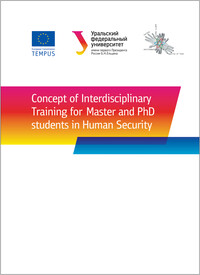Concept of Interdisciplinary Training for Master and PhD students in Human Security
Покупка
Издательство:
Издательство Уральского университета
Год издания: 2016
Кол-во страниц: 48
Дополнительно
Вид издания:
Монография
Уровень образования:
ВО - Магистратура
ISBN: 978-5-7996-1798-1
Артикул: 799266.01.99
The book delivers the Concept of Interdisciplinary Training (CIT) for Master and PhD students in Human Security that has been developed in frame of the TEMPUS project "Human Security (environment, quality of food, public health and society) on Territories Contaminated by Radioactive Agents”. The material presented is aimed to university teachers and students that are active in the areas of environment, quality of food, public health and society to enhance the human safety. the ideas and approaches could be of the wide public interests, too.
Тематика:
ББК:
- 511: Социальная гигиена и организация здравоохранения
- 744: Образование взрослых. Педагогика взрослых
УДК:
ОКСО:
ГРНТИ:
Скопировать запись
Фрагмент текстового слоя документа размещен для индексирующих роботов
Concept of Interdisciplinary Training for Master and PhD students in Human Security Ural University press 2016
УДК 378.1(07)
ББК Ч448я7
C 75
Compiled by
Yuri Dekhtyar (Latvia) and Elena Maestri (Italy)
C 75 Concept of Interdisciplinary Training for Master and PhD students in Human Security. — Ekaterinburg : Ural University Press, 2016. — 48 p.
ISBN 978-5-7996-1798-1
Abstract
The book delivers the Concept of Interdisciplinary Training (CIT) for Master and PhD students in Human Security that has been developed in frame of the TEMPUS project “Human Security (environment, quality of food, public health and society) on Territories Contaminated by Radioactive Agents”.
The material presented is aimed to university teachers and students that are active in the areas of environment, quality of food, public health and society to enhance the human safety. the ideas and approaches could be of the wide public interests, too.
This project has been funded with support from the European Commission within the framework of the Tempus Project “Human Security (environment, quality of food, public health and society) on the Territories Contaminated by Radioactive Agents”. This publication reflects the views only of the authors, and the Commission cannot be held responsible for any use which may be made of the information contained therein.
УДК 378.1(07) ББК Ч448я7
ISBN 978-5-7996-1798-1
© Ural University press, 2016
CONTENTS
ABOUT THE TEMPUS PROJECT ............................................ 4
CONTRIBUTORS ........................................................ 5
GENERALITY ............................................................. 6
The aim ............................................................. 6
The outcome ......................................................... 6
CONCEPT OF THE INTERDISCIPLINARY TRAINING .............................. 7
CIT for MSc.......................................................... 7
General approach ................................................ 7
The topics for CP............................................... 11
Skill improvement .............................................. 11
Modularization ................................................. 12
CIT specific approaches and modules ............................ 12
CIT for PhD ........................................................ 18
RECOMMENDATIONS TO IMPLEMENT CIT ...................................... 19
The guidelines for the Belarus universities ........................ 19
MSc students’ training.......................................... 19
PhD students’ training in the field of the human security (HS) . 24
The guidelines for the universities of Russia ...................... 25
The background for CIT in Russia ............................... 25
CIT for universities of Russia ................................. 26
PhD training ................................................... 28
The recommendations for the Ural Federal University as the typical example ......................................... 28
The guidelines for the universities of Ukraine ..................... 29
The background for CIT in Ukraine .............................. 29
The recommendations for the Zhytomyr State
Technological University and Sevastopol National University of Nuclear Energy and Industry ................ 31
The recommendations for the Kyiv International University and Vinnitsya National Medical University . 32
IMPLEMENTATION OF CIT ................................................. 34
ABOUT THE TEMPUS PROJECT
The Tempus Project* is funded by the European Commission. The objectives of the Project are the following:
— to support the modernization of Higher Education in Partner Countries of the surrounding area of the EU and Central Asia;
— to establish an area of cooperation between the EU and the Partner Countries;
— to favour voluntary convergence with the EU developments in the field of Higher Education.
“Human Security (environment, quality of food, public health and society) on the Territories Contaminated by Radioactive Agents” is a joint project of several organizations-consortium members which are University of Cordoba (Spain) being the coordinator of the Project, University of Parma (Italy), Swedish University of Agriculture Sciences (Sweden), University of Florence (Italy), Riga Technical University (Latvia), Voronezh State University (Russia), Chelyabinsk State University (Russia), Tyumen State Medical Academy (Russia), Ural Federal University named after the first President of Russia B. N. Yeltsin (Russia), Nuclear Cities Educational Information Center (Russia), Sevastopol National University of Nuclear Energy and Industry (Ukraine), Zhytomyr State Technological University (Ukraine), Vinnytsya National Pirogov Memorial Medical University (Ukraine),
Kyiv International University (Ukraine), Polissya Branch of Ukrainian Research Institute of F&FM (Ukraine), International Sakharov Environmental University (Belarus), Grodno State Agrarian University (Belarus), Grodno State Medical University (Belarus), Belarusian State University (Belarus).
* “Human Security (environment, quality of food, public health and society) on the Territories Contaminated by Radioactive Agents” The number of the Grant Agreement. 530644-TEMPUS-1-2012-1-ES-TEMPUS-JPCR.
CONTRIBUTORS
Major contribution to the text and conceptual development of this publication was made by the representatives of Riga Technical University (Latvia) and University of Parma (Italy) Yuri Dekhtyar and Elena Maestri respectively.
Contribution to this publication made by the following individuals representing both the Partner Universities and the European ones is acknowledged: Sergey Balashenko (Belarus), Ekaterina Mikhay-lenko (Russia), Marina Banzarakcaeva (Russia), Valeriy Mikhaylenko (Russia), Pavel Baradzin (Belarus), Franco Milano (Italy), Anna Bel-tikova (Russia), Ihar Naumau (Belarus), Iryna Davidova (Ukraine), Yulya Omelchuk (Ukraine), Sergey Ovchinnikov (Russia), Maria Frolova (Ukraine), Dmitry Pobedash (Russia), Olga Galiulina (Russia), Natalya Prokopenko (Belarus), Sergej Golovatij (Belarus), Olex-andr Pylypenko (Ukraine),Vladimir Kamynin (Russia), Aleh Rodzkin (Belarus), Eduard Kashuba (Russia), Klas Rosen (Sweden), Ruslana Kharkovenko (Ukraine), Eugenie Ryaboshtan (Ukraine), Igor Kras-vin (Russia), Boris Samotokin (Ukraine), Semjon Kundas (Belarus), Zoya Shelest (Ukraine), Semen Kurolap (Russia), Ludmila Suplotova (Russia), Sergey Likhachev (Russia), MykhailoVinichuk (Sweden), Vladimir Yelishev (Russia), Yauhenii Maisiayonak (Belarus), Evgeniy Zhilyakov (Russia), Vasyl Mamray (Ukraine), Albert Zhloba (Belarus), Svetlana Mazurek (Belarus).


